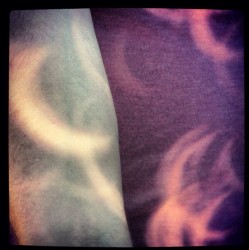This is a Space Rocket Epiphyllum that lives on our front porch. The diner-plate-sized blossoms explode in shades of fuchsia and crimson and then dissolve after a couple of days. The blooms, though short-lived, transport me in my imagination to another world where magnificent, over-the-top flora abound. I've been thinking that the Space Rocket Epiphyllum is an apt metaphor for the spiritual journey. Our awakenings and "aha's" burst into consciousness with mind-altering vivacity. Then they fade as the the "normal world" recaptures our attention.
At that moment of inevitable fading, we have a choice. We can cling to the outer form of our experience, or we can integrate the Essence (the "aha") to which the form was pointing and from which it came.
The deeper one goes into devotion...the more that the form [of the Divine] which he has visualized fades into formlessness...Paramhansa Yogananda gave further advice on the subject: "Whenever God comes to you in form - as, let's say, the Divine Mother - try to see in those eyes, not a human personality, but the consciousness of infinity." The Essence of the Bhagavad Gita, p. 168
Herein lies a difference between beneficial spirituality and ineffectual religion. When the Holy bursts into consciousness, healthy spirituality integrates the experience into body, mind, and heart without holding on to the form it came in. The integrated experience transforms our habitual behaviors and tightly held views. Ineffectual religion clings to the outer form without integration or transformation.
Maturity is to relish those blossoming moments when they occur...and remember them as touchstones...but to look through those moments to the Pure Essence. That's the content, the message, the insight, which is to be integrated.
You can recall the form anytime as a way to re-enter the experience, but then release the form and pivot attention to the bodily sensations that arise. Do you feel open, free, connected? What do you sense? Where in your body do you sense it and what is the sensation? Observe insights emerging in the spaciousness. Notice the different perspective from which you are experiencing life.
Let these gifts permeate your body, unsettle your ego, center you in your heart, and liberate your thinking.
Whether it's a Space Rocket Epiphyllum, a delicious meal, a kiss, or a panoramic vista, the form soon disappears. But what it evokes within us can endure if we integrate it. And what are we integrating? An Infinite Consciousness that holds the humdrum of our daily lives in a broader perspective of compassion, bliss, and equanimity. The reminders of this Consciousness quickly fade. The Consciousness itself is eternal.
